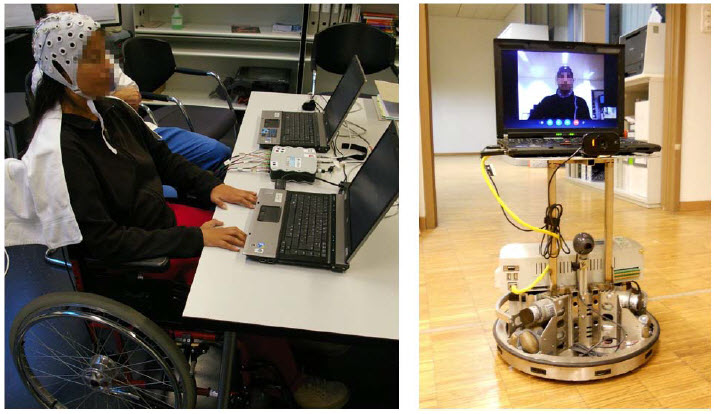Disabled people remotely pilot robot in another country with their thoughts
June 24, 2015

(Left) Patient at a clinic operating the BCI. (Right) Telepresence robot equipped with infrared sensors for obstacle detection and Skype video connection on top. (credit: Robert Leeb et al./Proceedings of the IEEE)
Using a telepresence system developed at the École Polytechnique Fédérale de Lausanne (EPFL ), 19 people — including nine quadriplegics — were able to remotely control a robot located in an EPFL university lab in Switzerland.
A team of researchers at the Defitech Foundation Chair in Brain-Machine Interface (CNBI), headed by professor José del R. Millán, developed a brain-computer interface (BCI) system, using electroencephalography (EEG) signals.
This multi-year research project was intended to give a measure of independence to paralyzed people. The research involved 19 subjects (nine disabled and ten healthy) located in Italy, Germany and Switzerland. For several weeks, each of the subjects put on a BCI helmet and instructed the robot to move, transmitting their instructions in real time via Internet from their home country.
The robot used a video camera, screen, and wheels, similar to the commercially available Beam system. The robot transmitted the image from its camera and displayed the face of the remote pilot, both via Skype.
Shared control between human and machine
“Each of the 9 subjects with disabilities managed to remotely control the robot with ease after less than 10 days of training,” said Millán. The robot was able to avoid obstacles by itself, even when not told to.
The tests revealed no difference in piloting ability between healthy and disabled subjects. In the second part of the tests, the disabled people with residual mobility were asked to pilot the robot with the movements they were still capable of doing, for example, by simply pressing the side of their head on buttons placed nearby. They piloted the robot just as if they were using their thoughts.
The positive results of this research bring to a close the European project called TOBI (Tools for Brain-Computer Interaction), which began in 2008. The research is discussed in the June special edition of Proceedings of the IEEE, dedicated to brain-machine interfaces.
École polytechnique fédérale de Lausanne (EPFL) | Telepresence robots can give people with disabilities the feeling of being home
Abstract of Towards Independence: A BCI Telepresence Robot for People With Severe Motor Disabilities
This paper presents an important step forward towards increasing the independence of people with severe motor disabilities, by using brain-computer interfaces to harness the power of the Internet of Things. We analyze the stability of brain signals as end-users with motor disabilities progress from performing simple standard on-screen training tasks to interacting with real devices in the real world. Furthermore, we demonstrate how the concept of shared control — which interprets the user’s commands in context — empowers users to perform rather complex tasks without a high workload. We present the results of nine end-users with motor disabilities who were able to complete navigation tasks with a telepresence robot successfully in a remote environment (in some cases in a different country) that they had never previously visited. Moreover, these end-users achieved similar levels of performance to a control group of 10 healthy users who were already familiar with the environment.